 MAGGIE LEAVES ALASKA - Maggie the Elephant is out of the cold. MAGGIE LEAVES ALASKA - Maggie the Elephant is out of the cold.
 TOP 10 ITEMS
SURGICALLY REMOVED FROM PETS- Hear what made the list. TOP 10 ITEMS
SURGICALLY REMOVED FROM PETS- Hear what made the list.
 DOGS AND
CATS CAN GET BREAST CANCER -
Can this be prevented? DOGS AND
CATS CAN GET BREAST CANCER -
Can this be prevented?
 FORECLOSURE
CRISIS -
Our pets are affected to. FORECLOSURE
CRISIS -
Our pets are affected to.
 PETS AS
GIFTS THIS HOLIDAY SEASON - 8 reasons
not to surprise someone. PETS AS
GIFTS THIS HOLIDAY SEASON - 8 reasons
not to surprise someone.
 FANCY PET
GIFTS ABOUND FOR THE HOLIDAYS What are you getting Fido or Fluffy? FANCY PET
GIFTS ABOUND FOR THE HOLIDAYS What are you getting Fido or Fluffy?
 DO YOU GET
STRESSED OVER THE HOLIDAYS? Don't
take it out on your pets! DO YOU GET
STRESSED OVER THE HOLIDAYS? Don't
take it out on your pets!
 ARE HOMELESS
HOUNDS HAPPIER? You will be surprised at the answer. ARE HOMELESS
HOUNDS HAPPIER? You will be surprised at the answer.
Also in this issue:
|
  Kinky
Friedman has the strangest bedfellows. He sleeps with a cat
on his head and four dogs in the bed. Kinky
Friedman has the strangest bedfellows. He sleeps with a cat
on his head and four dogs in the bed.
David Frei is back for his third time on Animal Radio®.
On the other 364 days he's devoting time to his pet project "Angel
on a Leash."
|
LISTEN TO ANIMAL RADIO NETWORK NOW
Listen to a LIVE STREAM of Animal Radio® Network's full-time animal channel
while you read this newsletter. The above link will launch player.
More listening options here. |
|
ASPCA Applauds Strong Sentencing
of Michael Vick's Co-Defendants:
Justice Is Being Served
 NEW
YORK- The ASPCA® (The American Society for the Prevention
of Cruelty to Animals®) today applauded the strong sentences
received by two co-defendants of NFL quarterback, Michael Vick,
in the Federal investigation against them. Purnell Peace and
Quanis Phillips received sentences of 18 and 21 months respectively,
which fall on the higher end of the Federal sentencing guidelines.
In addition, they will each be on probation for an additional
three years, during which time they cannot own or have any contact
with dogs. NEW
YORK- The ASPCA® (The American Society for the Prevention
of Cruelty to Animals®) today applauded the strong sentences
received by two co-defendants of NFL quarterback, Michael Vick,
in the Federal investigation against them. Purnell Peace and
Quanis Phillips received sentences of 18 and 21 months respectively,
which fall on the higher end of the Federal sentencing guidelines.
In addition, they will each be on probation for an additional
three years, during which time they cannot own or have any contact
with dogs.
"Today's sentencing by Judge Henry Hudson is an extremely
significant moment in the history of the prosecution of animal
cruelty," said Ed Sayres, president & CEO of the ASPCA.
"His decision clearly reflects the outrage that many of
us felt upon hearing details of the cruelty that had been inflicted
upon these animals-the innocent victims in this terrible situation.
We are deeply grateful that justice is being served."
Earlier this year, the two men, along with Vick and a fourth
co-defendant, Tony Taylor, pleaded guilty to Federal charges,
which included conspiring to travel in interstate commerce in
aid of unlawful activities ("Travel Act"), and to sponsoring
a dog in an animal fighting venture. Vick, who voluntarily surrendered
himself on November 19 to begin serving his prison term early,
will face sentencing on December 10.
"The ASPCA has assisted Federal authorities with this investigation
from its early stages, most recently having led a team of
animal behavior experts in evaluating the dogs seized from Vick's
Virginia property by Federal officials," continued Mr. Sayres.
"We are incredibly proud to have played such an instrumental
role in this landmark case which, I believe, will change the
way America regards and reacts to the cruel treatment of animals."
The ASPCA continues to assist in the case and is working closely
with the Guardian/Special Master of the dogs, Rebecca Huss, to
further evaluate the dogs. Due to the sensitive nature of the
evaluations and the ongoing criminal process, further details
are not possible at this time. For more information on the ASPCA,
or to learn more about staying alert to animal cruelty, please
visit www.aspca.org/cruelty
.
| Hear
breaking news as it happens - Animal Radio®
is streaming online 24/7 Listen LIVE Now! |
|
Kinky Friedman
 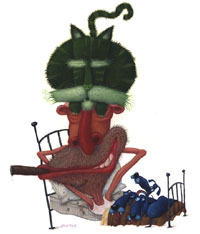 Do you know that Al Franken's dog Kirby eats
poop but Al loves (and kisses) Kirby anyway; that Dave Barry
really, really wants a dog; and that Kinky Friedman sleeps with
his four dogs and a cat named lady (and a shot gun!)? Find out
this and more in Howl, a Collection of the Best Contemporary
Dog Wit By the Editors of Bark. Do you know that Al Franken's dog Kirby eats
poop but Al loves (and kisses) Kirby anyway; that Dave Barry
really, really wants a dog; and that Kinky Friedman sleeps with
his four dogs and a cat named lady (and a shot gun!)? Find out
this and more in Howl, a Collection of the Best Contemporary
Dog Wit By the Editors of Bark.
Kinky not only discusses his
sleeping arrangements (his cat sleeps on his head, surrounded
by four dogs) but talks about Dilly, his pet armadillo, and his
run for governor of Texas.
The son of a University of
Texas professor who raised his children on the family ranch,
Rio Duckworth, he was born Richard F. Friedman. He studied psychology
in Texas and founded his first band while there. However, King
Arthur & the Carrots -- a group that poked fun at surf music
-- recorded only one single, in 1966. After graduation, Friedman
served three years in the Peace Corps; he was stationed in Borneo,
where he worked as an agricultural extension worker.
Kinky runs the Utopia Animal
Rescue Ranch, which is currently home to 60 dogs, 10 pigs, 3
donkeys, horses and cats, which are available for adoption.
http://www.utopiarescue.com
 Hear Kinky on Animal Radio® Hear Kinky on Animal Radio®
From Show Dogs to Therapy
Dogs
David Frei, Westminster
Kennel Club Dog Show
 David Frei is one busy guy. Davis
is gearing up for not only The National Dog Show on Thanksgiving
Day, but he will be co-hosting the Westminster Kennel Club Dog
Show in February. He is also the founder of Westminster's Angel
On A Leash therapy dog program. David Frei is one busy guy. Davis
is gearing up for not only The National Dog Show on Thanksgiving
Day, but he will be co-hosting the Westminster Kennel Club Dog
Show in February. He is also the founder of Westminster's Angel
On A Leash therapy dog program.
Angel on a Leash champions
the use of therapy dogs in health care facilities, schools, rehabilitation,
hospice, extended care, correctional facilities and crisis intervention.
Through advocacy, education, research and service, Angel on a
Leash, promotes the role of the human-animal bond in enhancing
human health and quality of life.
Angel in a Leash began as a
charitable activity at the Morgan Stanley Children's Hospital
of New York-Presbyterian for the Westminster Kennel Club less
than five years ago. Beginning with a handful of teams, the program
quickly grew to include nearly 30 teams.
David also gives us some exciting
news for Westminster. There will be four new breeds eligible
for the first time at Westminster in 2008: the Plott (Hound Group),
the Tibetan Mastiff (Working), the Swedish Vallhund (Herding)
and the Beauceron (Herding). This is the first time in several
years that new breeds will be judged.
David currently is the guardian
of two Brittanys, Teigh and Belle, who are therapy dogs that
visit people in New York Hospitals every week.
http://www.WestminsterKennelClub.org
http://www.DavidFrei.com
 Hear David Frei on Animal Radio® Hear David Frei on Animal Radio®
Maggie
Leaves Alaska
Capt. Kelley Jeter
 How do you move an elephant from
Alaska to California? You call in the Air Force! As no commercial
airlines could carry the 8,000-pound elephant, the Air Force
was called in who then used a C-17 military plane, which is normally
used to transport tanks, to move Maggie out. How do you move an elephant from
Alaska to California? You call in the Air Force! As no commercial
airlines could carry the 8,000-pound elephant, the Air Force
was called in who then used a C-17 military plane, which is normally
used to transport tanks, to move Maggie out.
This is not the first time
the military has helped moved a large animal. Back in 1998, the
Air Force moved Keiko, a killer whale, to Iceland from Oregon,
also on a C-17.
Maggie, Alaska's lone elephant,
was moved to the Performing Animal Welfare Society (PAWS) in
California after many years of controversy. Many people felt
Alaska was not the proper environment for an elephant, and when
Maggie fell down twice this year and needed help to get up, it
was realized that perhaps they were right.
A large group of people came
out to say their final goodbyes to Maggie, and as she boarded
the plane, she trumpeted twice as if to say goodbye.
After a 4 and 1/2 hour flight,
Maggie landed safely in California. See Maggie Coverage
 Hear Capt.
Jeter on Animal Radio® Hear Capt.
Jeter on Animal Radio®
Top
10 Items Surgically Removed from Pets
 If you thought your dryer was
eating your socks, guess again! It seems the number one item
swallowed by dogs that had to be surgically removed are socks. If you thought your dryer was
eating your socks, guess again! It seems the number one item
swallowed by dogs that had to be surgically removed are socks.
The top 10 list is as follows:
1. Socks
2. Underwear
3. Panty Hose
4. Rocks
5. Balls
6. Chew Toys
7. Corn Cobs
8. Bones
9. Hair Ties/Ribbons
10. Sticks
Other items that animals have
ingested are nails, sewing needles and nipples from baby bottles.
But let's not forget remote controls, pagers, hearing aids, drywall,
snail bait, batteries, rubber bands, toy cars, and sand with
bacon grease poured on it.
Some of these items will pass
through their digestive system naturally, but others can become
lodged in their intestinal tracts resulting in pain, vomiting,
or internal injury. In those cases, surgery may be a necessity.
The best thing to do is to
make sure these items are unavailable to our pets. Make sure
there are plenty of items available for your pet to chew on.
And, you can always spray something on the items to make them
taste bed such as "Bitter Yuck No Chew" spray.
 Hear what
other items dogs have swallowed on Animal Radio® Hear what
other items dogs have swallowed on Animal Radio®
Comedian Kip Addotta
 Kip
discuss his cat "Harley," whom he says owns him, and
is the longest relationship he has ever maintained with a female!
Listen in
as Kip talks about some great flea remedies he discovered, using
only soap, water and a light bulb! Kip
discuss his cat "Harley," whom he says owns him, and
is the longest relationship he has ever maintained with a female!
Listen in
as Kip talks about some great flea remedies he discovered, using
only soap, water and a light bulb!
Kip was born in Rockford, IL
of Sicilian parents. His father, Frank, worked as a machinist
his mother, Josephine, remains a mystery having left the home
when Kip was two years old. Kip was put in an orphanage at the
age of three and remained there until his Grandmother took fulltime
custody when he was five. "I have always felt lucky to have
been raised by a saintly woman. She spent a lot of time with
me, teaching me the difference between right and wrong."
His Grandmother, Don na Cicca,
Francisca Addotta raised Kip in a strict religious environment,
going to Mass every morning and saying the rosary and making
The Stations Of The Cross every night. He was being groomed to
be a priest.
At the same time Kip was also
being isolated from the influence of the outside world. His Grandmother,
closely, screened his friends and he was only allowed to leave
the house for a half hour a day. "Some might think that
this was cruel but I knew that was done from love and that I
was being treated as someone special. Someone, who was going
to spend his life serving God. I didn't feel this about myself
but I did go along with it out of respect for my Grandmother."
His grandmother died when Kip
was fifteen and all thoughts of the priesthood went the way of
the wind. Kip, was placed in the charge of his father until he
moved out on his own at sixteen.
Kip Addotta has made over 32
guest appearances on "The Tonight Show," and is still
entertaining crowds on the radio and at clubs.
http://www.KipAddotta.com
 Hear Kip on Animal Radio® Hear Kip on Animal Radio®
Legal Path Clear to Ban Declawing
Merritt Clifton,
Animal People
 California cities and counties
may ban declawing cats. The California Supreme Court affirmed
this on October 10, 2007, when it refused to hear an appeal filed
by the California Veterinary Medical Association (CVMA) against
a West Hollywood ordinance adopted in 2003. Tune in to find out
why the CVMA is opposed to the ban could it be a money
thing? California cities and counties
may ban declawing cats. The California Supreme Court affirmed
this on October 10, 2007, when it refused to hear an appeal filed
by the California Veterinary Medical Association (CVMA) against
a West Hollywood ordinance adopted in 2003. Tune in to find out
why the CVMA is opposed to the ban could it be a money
thing?
The West Hollywood ordinance
is the only local anti-declawing law in California, but other
communities are expected to adopt similar legislation now that
the legal path is clear.
http://www.animalpeoplenews.org
 Hear Merritt Clifton on Animal Radio® Hear Merritt Clifton on Animal Radio®
Meerkat Manor
Pam Bennett-Wahlberg, Fellow Earthlings' Wildlife Center,
Inc.
 Fellow Earthlings' Wildlife
Center is a privately licensed 501(C)3 non-profit facility that
specializes in caring for meerkats. The animals are provided
a permanent home and come to us from accredited zoological parks. Fellow Earthlings' Wildlife
Center is a privately licensed 501(C)3 non-profit facility that
specializes in caring for meerkats. The animals are provided
a permanent home and come to us from accredited zoological parks.
Meerkats are placed here for
a variety of reasons: The animals may be orphaned, injured, sick,
old, or the previous facility may simply be out of room and can
no longer care for them. You and your guests can visit our Center
and hand-feed the meerkats through our "Adopt" program.
Fellow Earthlings' Wildlife
Center is proud to be partnered with Animal Planet on their hit
series Meerkat Manor. Our Director, Pam Bennett-Wahlberg, is
the publicity spokesperson for the series.
Adopt A Meerkat Program
 Our "Adopt a Meerkat
Program" entitles you and up to three of your guests to
enjoy a private, two-hour interactive experience with all of
the meerkats at our Center. You will be able to feed, photograph,
and play with our wee rascals. The meerkats will enjoy taking
treats from your hand, sitting in your lap, untying your shoelaces,
and peeking in your pockets. Our "Adopt a Meerkat
Program" entitles you and up to three of your guests to
enjoy a private, two-hour interactive experience with all of
the meerkats at our Center. You will be able to feed, photograph,
and play with our wee rascals. The meerkats will enjoy taking
treats from your hand, sitting in your lap, untying your shoelaces,
and peeking in your pockets.
Your $100.00 tax-deductible
donation to Fellow Earthlings' Wildlife Center, Inc., a 501(C)3
non-profit facility, will be used to provide the meerkats with
food, veterinary care, housing, and toys.
We are open, by appointment,
to our Adoptive Parents and their guests on Friday, Saturday,
and Sunday during the months of March through December.
Our fully licensed Center is
located 25 minutes from world-famous Palm Springs, California.
Driving time from San Diego and Los Angeles is two hours. Magnificent
Joshua Tree National Park is just 20 miles from our Center.
Please note: While meerkats
are adorable and captivating, they do not make good pets. Surprisingly,
meerkats are one of the most strictly regulated animals in the
world. They are illegal to own without the proper licenses and
permits. Of course, all "adopted" meerkats remain living
at Fellow Earthlings' Wildlife Center, Inc. THE MEERKATS THANK
YOU!
http://www.meerkats.com
 Hear Pam Bennett-Wahlberg on Animal Radio® Hear Pam Bennett-Wahlberg on Animal Radio®
Dogs,
Cats Not Immune to Breast Cancer
Dr. Gerald Post,
Veterinary Oncology and Hematology Center
 We are hearing more
and more about our pets getting some of the same diseases that
humans get. Now, we find out that they can get breast cancer
as well, known as mammary cancer. Cancer is now the No. 1 natural
cause of death in older pets. We are hearing more
and more about our pets getting some of the same diseases that
humans get. Now, we find out that they can get breast cancer
as well, known as mammary cancer. Cancer is now the No. 1 natural
cause of death in older pets.
Dr. Post states that mammary
cancer is very common in unspayed female dogs and cats. He states
it is very important to spay your pets before they have their
first heat, which will greatly reduce the risk of mammary cancer.
While about half of the mammary
tumors found in dogs are usually non-cancerous, those found in
cats have about a 90% chance of being cancerous.
Because our animals have shorter
lives than we do, cancer can be found in them sooner. And because
environmental problems are the same for animals and people, we
can use them as models, sort of like the "canary in the
coal mine," warning us of risk factors that we should look
out for as well.
While a veterinarian should
see your pet annually, you can also do a physical exam on your
pet weekly or monthly. Have your pet lie on their side on the
floor while you check for lumps, or have them sit in your lap
while someone else checks them over.
Some signs of mammary cancer
are abnormal swellings that persist or grow larger; sores that
won't heal; weight loss or loss of appetite and bleeding or discharge
from any body opening.
"Early detection and diagnosis
is the key to great health," Ogilvie said, adding that if
the cancer is detected early, animals have a good rate of survival.
Then, they can continue to help amuse, annoy and comfort their
human companions for many more years to come.
http://www.oncovet.com
http://www.animalcancer.org
 Hear Dr. Gerald Post on Animal Radio® Hear Dr. Gerald Post on Animal Radio®
Foreclosure
Crisis Claims Family Pets, Animal Shelters Overflow
by Sharon Secor
 According to recent news reports,
in areas of the nation where the foreclosure crisis is hitting
hard, local animal shelters are seeing a sharp increase in the
number of owners surrendering family pets, many citing the loss
of their home as their reason. One news report quoted an official
at the Escondido Humane Society, located in California, a state
hard hit by the recent mortgage industry turmoil, as saying that
the organization receives between 20 and 30 calls per day from
people who are losing their homes to foreclosure and have no
place for their pets. According to recent news reports,
in areas of the nation where the foreclosure crisis is hitting
hard, local animal shelters are seeing a sharp increase in the
number of owners surrendering family pets, many citing the loss
of their home as their reason. One news report quoted an official
at the Escondido Humane Society, located in California, a state
hard hit by the recent mortgage industry turmoil, as saying that
the organization receives between 20 and 30 calls per day from
people who are losing their homes to foreclosure and have no
place for their pets.
While, for some, losing the
family pets may seem like the least of worries in a potential
foreclosure situation, that is simply not the case for families
with children who've grown up with the pets or for many elderly
people, for whom these pets are near constant companions. Facing
the loss of pets is akin to the heartbreak of losing family members,
which is exactly what their pets are to them.
Fighting Foreclosure
For families with pets, fighting
foreclosure is often the best bet when it comes to keeping their
pets. Renting with pets is often very difficult, as restrictions
can be very tough on the type, size and number of pets allowed.
Fortunately for homeowners in trouble, as the mortgage crisis
expands and the number of foreclosures increases, federal, state,
and local government officials are scrambling to find solutions.
Legislative bodies throughout the nation are coming together
to see what they can do to slow the tide of displaced families
and homeowners. Even some of the major players in the mortgage
lending industry are stepping up to the plate to take their turn
at seeing what can be done to prevent homeowners from foreclosure.
Naturally, few of these actions
are the result of altruistic instincts. Politicians don't want
thousands to lose their homes on their watch, as that could affect
the way they are perceived by voters. Lenders and others involved
in the real estate industry recognize that foreclosure is expensive.
Not only does each foreclosure cost a great deal to complete,
but in neighborhoods where there are several foreclosures, the
empty homes do nothing good for the value of surrounding properties.
Some common legislative steps
include increasing the amount of help available to homeowners
seeking to avoid foreclosure. At the federal level, agencies
are receiving funding to offer financial counseling to homeowners,
helping them to renegotiate mortgage loans and conditions with
their lenders. Legislation seeking to adjust regulations so that
struggling homeowners may have a better chance at refinancing
home loans are also part of the planned efforts geared towards
keeping homeowners and their families in their homes.
State and local governments
are also working on passing legislation and changing regulations.
While a great deal of effort is being put into preventing predatory
lending, steps are being taken to address the situations of homeowners
already in trouble. Some state and local governments are requesting
a moratorium on foreclosures, though that step is unlikely to
become official law.
Big industry players, like
Countrywide, are taking matters into their own hands, and taking
steps to work with homeowners. That is because many are facing
an inordinate amount of foreclosed properties that they have
to deal with. It makes more sense for them to avoid becoming
flooded with defaulted loans and properties. Some have decided
to hold back on resetting adjustable rate mortgage interest rates
temporarily, allowing homeowners to try to get prepared.
If currently facing a foreclosure
threat, don't give up right away. Take advantage of the programs
that are designed to help and explore all options. You just may
find that there is a solution that will keep your family and
your pets together by avoiding foreclosure.
If Foreclosure Is Unavoidable
If it does turn out that foreclosure
is unavoidable, surrendering pets may still be avoided. In many
regions, the value of pet-ownership for the elderly is recognized
and regulations require that a small pet be allowed in rental
units designed for older people. With enough time, it is possible
to find rentals that do allow pets, though there may be extra
costs associated, either a higher security or an extra monthly
fee. If time runs short, you may want to try to talk friends
or family into accepting payment to care for your animals temporarily.
For those who are not able
to find a rental that allows pets in time, but are still unwilling
to give up their four-legged family members, there is a down
and dirty tactic that can be employed to buy time. Keep looking
for the right rental, but take what you can at the moment and
smuggle the pets in. Don't bother to unpack much, as you'll probably
be getting evicted soon. But, at least you've bought a little
more time to find the right place.
If your situation doesn't allow
for such tactics, and you really do have to surrender your pets,
there are a couple of options to consider that will at least
ensure that they are not killed. A no-kill shelter is the obvious
choice, but recognize that you may have to travel, as many are
filling up rapidly. If your pets are purebred, you may have the
option of contacting a breed specific rescue organization for
help. Many will take the pet and provide a foster home for it
while looking for a permanent home.
As recent news stories suggest,
the toll that the mortgage and lending industry crisis is having
is not only a human one. As families are displaced, so too are
their pets. Often, the pets are just about as much a part of
the family as the people are, making it quite tragic for all
involved that a temporary financial setback can potentially result
in the loss of a beloved family pet. Fortunately, this doesn't
always have to be the case when facing foreclosure. There are
options, particularly for those inspired to take the time and
effort to find them or willing to engage in a bit of creativity.
Sharon Secor writes for a
variety of publications and websites, including Direct Lending
Solutions and Lenders Mark. Her journey into freelance writing
was inspired by Christine de Pisan (1364-1429), a widow and writer
of social commentary who, in addition to being one of France's
earliest well-known female authors, was able to support her children
through her writing. Ms. Secor is working towards completing
a double major in Journalism and Spanish preparation for
writing for both English and Spanish language markets about social
and economic issues in Latin America, as influenced by increased
industrialization and the global marketplace. As an anarchist
and single parent, she also devotes her time to practicing resistance
and raising revolutionaries.
|
|
Coming Up on Animal Radio®:
 Ed
Begley was inspired by the works of his Academy Award-winning
father and became an actor. He first came to audiences' attention
for his portrayal of Dr. Victor Ehrlich on the long-running hit
television series, "St. Elsewhere," for which he received
six Emmy nominations. Since then Begley has moved easily between
feature, television and theatre projects. Ed
Begley was inspired by the works of his Academy Award-winning
father and became an actor. He first came to audiences' attention
for his portrayal of Dr. Victor Ehrlich on the long-running hit
television series, "St. Elsewhere," for which he received
six Emmy nominations. Since then Begley has moved easily between
feature, television and theatre projects.
As environmental issues become
more pressing, there are two possible responses: forget it and
hope that government and corporations will figure it out, or
take action yourself.
In the "take action yourself" camp, a few individuals
are leading the way. One such person in California is Ed Begley,
Jr.
Environmental lawyer and long-time friend, Bobby Kennedy, Jr.
has said "Ed has a greater sense of social obligation than
anyone I know. He's like a West Coast cadet who gets up every
morning and says 'reporting for duty'".
http://www.edbegley.com
Wiggles,  Wigs
for Dogs. The
day of emulating celebrity hairdos is now no longer reserved
for fans or even humans! Wigs
for Dogs. The
day of emulating celebrity hairdos is now no longer reserved
for fans or even humans!
Wiggles is the brainchild of
Ruth Regina, a master wig maker whose notoriety in her
field spans a half a century. The lover of her art and the love
of animals made an odd and unique coupling twenty years ago when
a friend asked her to make a wig for her beagle. One order turned
into many, one interview turned into a series of high profile
engagements and Wiggle Dog Wigs was born.
Ruth will be unveiling her
new Christmas Line of dog wigs.
http://www.wigglesdogwigs.com
|
|
|
Animal Minute on
Animal
Radio®
with Britt Savage |
Santa Sues the Air Force
 In
February, a Danish man who works as a part-time Santa Claus,
filed a claim with the Danish Air Force saying that one of his
reindeer had died of a heart attack after two fighter jets passed
over his farm. The man said that the death of the reindeer, whose
name was not disclosed, would leave him with only one to pull
his sleigh next Christmas. In
February, a Danish man who works as a part-time Santa Claus,
filed a claim with the Danish Air Force saying that one of his
reindeer had died of a heart attack after two fighter jets passed
over his farm. The man said that the death of the reindeer, whose
name was not disclosed, would leave him with only one to pull
his sleigh next Christmas.
After checking flight data
and veterinary reports, the air force agreed that the planes
had probably caused the death and said it would pay the claim.
"We got a letter from Santa," said a spokesman, "and
looked into it seriously."
The air force will pay the
cost of a new reindeer, plus the vet expenses.
Bambi Caught Offshore
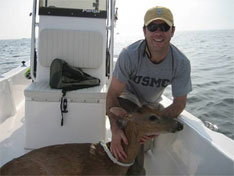 What
started out to be a slow fishing day for two fishermen, turned
out to be the "catch of the day." What
started out to be a slow fishing day for two fishermen, turned
out to be the "catch of the day."
Looking out over the water,
the fisherman saw what they thought to be a seal. But realizing
that seals weren't normally in this area, they kept a lookout.
When they got closer, they realized it was a deer swimming desperately
trying to keep afloat and having a difficult time at it. The
deer then headed straight for their boat, possibly thinking it
might be land. But when the deer reached the boat, it saw the
fisherman and had second thoughts.
The guys knew if the deer was
to survive, they had to act fast. One of the fishermen grew up
around cows and quickly lassoed the deer. They then got the deer
in the boat but were afraid that he would start kicking. But
luckily for the fisherman, the deer was too exhausted to do anything.
They put the boat into high
gear and rushed the deer to shore where he was released.
Britt Savage is a regular
Animal
Radio® correspondent as well as an incredibly talented
musician! She can be heard daily on Animal Radio Network.LISTEN TO ANIMAL RADIO NETWORK NOW
Veterinary Minute
on Animal Radio®
with Dr. Jim Humphries |
Unexpected Pet Bills Lead to New Ways to Pay
 Pet
owners love to spend money on their pets! But what happens when
their dog is hit by a car or their cat needs emergency surgery?
Advances in medical care for pets have made miracles possible,
but they also come with a price. What are your options to help
with these unexpected pet costs? Pet
owners love to spend money on their pets! But what happens when
their dog is hit by a car or their cat needs emergency surgery?
Advances in medical care for pets have made miracles possible,
but they also come with a price. What are your options to help
with these unexpected pet costs?
Between the United States and
Canada, pet owners will spend more than $45 billion on toys,
foods, accessories and healthcare for their four-legged family
members. But, despite this love for our pets, a single traumatic
event or serious disease can devastate personal finances or potentially
lead to heart-wrenching decisions. Fortunately, the availability
of pet insurance, pet health savings plans and even credit for
pets may help some pet owners keep their pets around longer.
The problem consumer advocates don't think it's a good plan.
Pet insurance is not a brand
new idea and actually has been around for more than 25 years.
In almost every case, pet insurance works as a reimbursement
insurance. This means that you, the pet owner, pay the veterinarian
for the services and then submit a claim to the company. After
deductibles are applied, the insurance company will send out
a check based on the type of plan you purchased for your pet.
Although you won't get 100% of your money back, it can help to
ease the financial burden in the event of serious disease or
injury.
But some consumer advocate
groups don't agree. Consumer Reports® has stated that insurance
is only beneficial if something catastrophic happens to your
pet. They recommend placing your premium payments into a savings
account instead. Saving just $30 per month (a typical premium
for pet insurance) in an account that generates 5% interest will
create $6,000 over the lifetime of the pet, according to their
calculations.
And, veterinarians, as a whole,
have not been overly receptive of pet insurance. Many fear becoming
part of a managed care system and some fear being disappointed
by the insurance company. Dr. Thomas Beall of Iowa feels strongly
about helping pet owners plan for unexpected events. His website,
www.PetVetPro.com,
encourages owners to set up a pet health savings plan. Beall
says that packages on his site will help. "This will be
set up for them as a automatic withdrawal and will help "weak
willed" savers. Just like is done for retirement plans.
If you don't see the money, you don't miss it."
Jack Stephens, founder of Pets
Best Pet Insurance has a different view of savings plans. He
says, "Medical problems don't wait until you have saved
enough and then stay within the savings you have accumulated."
He further describes the story of Abby, a young lab mix puppy
who needed more than $7,000 worth of veterinary care. Pets Best
paid about 80% of the total bills even though less than $100
of premiums had been paid. "If they had a pet savings account,
they would have had $30-60", says Stephens. It is quite
possible that Abby could have been put to sleep if her owners
had not opted for pet insurance.
With less than 1% of American
pet owners and only about 9% of Canadian owners utilizing any
sort of pet insurance or savings plan, what other options are
available? Most veterinarians cannot offer any sort of billing
plan and many owners have their cash and credit cards tied up
with other purchases. Fortunately, for some pet owners, CareCredit
(www.carecredit.com)
may be a solution. CareCredit offers several flexible payment
options that allow clients to make payments over a period of
several months. But, like other lines of credit, interest rates
can skyrocket if the balance is not paid within a specified time
frame.
The advances in veterinary
medicine over the past few decades have been absolutely amazing.
Our pets are living longer due to the skills and dedication of
their veterinarians. But, there are costs associated with the
life-saving skills and high-tech equipment. If your pet suffers
a traumatic injury or serious illness, make sure that you understand
the costs as well as the procedures. Talk with your veterinarian
about the options that are available to you and, above all, be
proactive in planning for your pet's healthcare. Visit www.MyVNN.com to learn more about how unexpected
pet health costs can affect you.
Dr. Humphries is a veterinarian
in Colorado Springs and the National News Director for Veterinary News Network. Hear the Veterinary
Minute exclusively on Animal Radio®-LISTEN TO ANIMAL RADIO NETWORK NOW
| Ask the Cat Coach with
Marilyn Krieger |
Is My Cat Lonely?
Dear Cat Coach,
 I have a 10 year old male cat
named Andy who has always lived with me since he was 4 months
old. He is a wonderful cat, loves for me to play and groom him
whenever possible. There have never been any other dogs or cats
living with us. He's my little buddy, is always with me when
I'm home. Lately I've been worried that he might be lonely since
I've been working longer hours then usual. Do you think it would
be a good idea to adopt another cat for him to play with? If
so, should it be a kitten or an older cat? I want to make sure
that my Andy is happy and isn't lonely when I go to work. I have a 10 year old male cat
named Andy who has always lived with me since he was 4 months
old. He is a wonderful cat, loves for me to play and groom him
whenever possible. There have never been any other dogs or cats
living with us. He's my little buddy, is always with me when
I'm home. Lately I've been worried that he might be lonely since
I've been working longer hours then usual. Do you think it would
be a good idea to adopt another cat for him to play with? If
so, should it be a kitten or an older cat? I want to make sure
that my Andy is happy and isn't lonely when I go to work.
Tony
Dear Tony,
Andy is better off with no other pets in the household. You and
he have always been a team of two with no other players. Andy
has been your little buddy since he was a kitten and most likely
won't welcome another animal into his home. Odds are that bringing
in a new cat will stress him out and make him very unhappy. Instead
of entertaining thoughts of another cat, provide environmental
enrichment for him when you are away from home. Turn on the television,
or provide him with CD or tapes made especially for cats. Kitty
Catnip and the Cat Sitter are two that come to mind. They are
filled with the sights and sounds of birds, fish, insects and
other fascinating creatures. Andy would also appreciate a tall
cat tree with lots of wide shelves located next to a secure window.
Other enrichment activities include toys such as puzzle boxes
that you can hide treats and toys in. Make him work a little
bit for his food by hiding treats in boxes and bags.
It is also important to provide
Andy with quality time when you are home. Every day have regular
scheduled play, grooming and cuddle sessions with him. Andy will
also appreciate a reminder of you when he's alone during the
day. Before going to work, put your sleeping attire from the
night before in his favorite daytime napping spots.
Marilyn Krieger, CCBC is
a Certified Cat Behavior Consultant. She can be reached for phone
and on-site consultations to help solve cat behavior problems
either by e-mail marilyn@thecatcoach.com
or by phone: 650 780 9485. Marilyn is the Cat Behaviorist for
the Cat Channel, Cat Fancy Magazine's web presence. Additionally,
Marilyn teaches cat behavior classes and is available for speaking
engagements. You can find out more about The Cat Coach at www.thecatcoach.com.
Copyright 2007 Marilyn Krieger, CCBC All Rights Reserved.
Don't
Abuse Your Pets or Other Animals When You're Stressed
By Stanley Popovich
 Everybody deals with stress and anxiety,
however some people sometimes take it out on their pets. Instead
of taking your problems and frustrations out on your pets or
other animals, here is a list of techniques that a person can
use to help manage their stress, anxieties, and fears. Everybody deals with stress and anxiety,
however some people sometimes take it out on their pets. Instead
of taking your problems and frustrations out on your pets or
other animals, here is a list of techniques that a person can
use to help manage their stress, anxieties, and fears.
When facing a current or upcoming
task that overwhelms you with anxiety, the first thing you can
do is to break the task into a series of smaller steps. For example,
changing careers can be a stressful situation. In order to help
manage this task, try to divide this goal into a series of smaller
steps and do each of these tasks one at a time. Completing these
smaller tasks one at a time will make the stress more manageable
and increases your chances of success. This is a lot more effective
then taking your frustrations out on your pet.
Sometimes, we get stressed
when everything happens all at once. Instead of taking it out
on your dog or cat, a person should take a deep breathe and try
to find something to do for a few minutes to get your mind off
of the problem. A person could take a walk, listen to some music,
read the newspaper or do an activity that will give them a fresh
perspective on things. This mental timeout can help you refocus
on your current situation.
In dealing with your anxieties,
a person should learn to take it one day at a time. Instead of
focusing on exaggerated assumptions that may or may not happen,
focus on the present and take it one day at a time.
Sometimes, it helps to be able
to talk to someone about our stressful situations. Talking to
a trusted friend, counselor, or clergyman can not only make us
feel better, but they might be able to give you additional advice
and insights on how to deal with your current problem. This is
a lot more effective than yelling at your dog or cat.
It is not easy to deal with
our stressful problems, however taking our frustrations out on
your pets or other people will not make the problem go away.
When things are not going right, try to remember to treat your
pet in the way you would want to be treated.
Stan Popovich is the
author of "A Layman's Guide to Managing Fear Using Psychology,
Christianity and Non Resistant Methods" - an easy to read
book that presents a general overview of techniques that are
effective in managing persistent fears and anxieties. For additional
information go to: http://www.managingfear.com
Fancy
Pet Gifts Abound for Holidays
By Dave Carpenter AP
Business Writer Chicago
 Coco's Christmas was doggone good last year. Coco's Christmas was doggone good last year.
The 5-year-old Shih Tzu got
a stocking full of treats and found a pink wool sweater, pink
mohair sweater, black fur-trimmed parka and hiking boots waiting
under the tree last December. This year, her owner is eyeing
a $120 set of pearls with a sterling silver bone clasp along
with plenty of edible goodies for the pooch who has almost everything.
"It's an expression of
love," said Shannon Fay, a 38-year-old Chicagoan. "She's
part of the family."
Pets rule at the holidays,
especially dogs, and that helps keep many retailers' registers
ringing.
U.S. retail sales may be weak,
energy prices way up and housing prices way down, but experts
say pets largely defy such economic indicators. Caring owners
are no more likely to stiff their beloved animals for the holidays
than Santa is to leave rocks in every stocking.
Overall, Americans are expected
to spend an estimated $48.7 billion on their pets in 2007, nearly
twice the amount of a decade ago and growing at more than 7 percent
a year, according to Packaged Facts, a consumer research company
in Rockville, Md. Already, spending exceeds the gross domestic
product of about 120 nations.
In other words, whatever Fido
wants, Fido gets - and then some, particularly in upscale areas.
"It's kind of recession-resistant
where we're at," said Steve Coghlan, co-owner of Spoiled
Rotten Pets in Chicago's posh Lincoln Park neighborhood. "People
are going to spend on their pets no matter what. They're not
going to cheat their dogs."
That's especially true when
it comes to the holidays. Fifty-six percent of dog owners and
42 percent of cat owners bought holiday gifts for their pets
last year, according to a survey by the American Pet Products Manufacturers Association.
Doug Poindexter, president
of the World
Wide Pet Industry Association, another trade group, says
the gift-giving trend reflects the growing humanization of pets
in this country.
"If you're going to do
it for your child, you're probably going to do it for your pet
as well," he said.
Buying Christmas or Hanukkah
gifts for the kids - the furry kind - isn't what it used to be.
Walk the aisles of a well-stocked pet store at the holidays or
cruise Web sites and there is abundant evidence of how enterprising
American businesses are trying to part pet lovers from their
cash.
High-end, luxury items are
increasingly popular. A prospective pet pamperer can find everything
from organic cookies and doggie basketball jerseys and jackets
to $70 treat jars, $399 temperature-controlled pet carriers and
$499 cashmere pet beds.
At Barker & Meowsky, a
particularly creative Chicago pet store, the range of products
could cheer up any sour puss: Catnip cigars, dog antlers, elf
outfits, faux fur cat sleeping bags, plush-toy musical Menorahs,
Christmas scarves and even some real bling: a $250 crystal-encrusted
dog collar made from python skins with a matching $190 leash.
Pet owners love to indulge
in fun products for their four-legged family members, according
to owner Alice Lerman.
"A sense of humor is so
important," she said. "And it's got to be wrapped,
it's got to be sealed, it's got to be just like you were giving
it to a person. That's a really common request that we get."
Some humans, perhaps sniffing
a possible promotion, even get Secret Santa gifts for the boss'
dog.
Elsewhere, there are all manner
of gifts - themed gifts such as rawhide canes and cat stockings;
healthy gifts such as dog energy nutrition bars; gifts for the
socially conscious such as organic cotton leashes with proceeds
supporting African refugee camps; eco-friendly gifts such as
biodegradable poop-pickup bags, and gifts for weak-armed dog
owners such as tennis-ball slingshots.
Doctors Foster and Smith, a well-known pet supplier, features
16 pages of gift products in its fall catalog. Even Dr. Marty
Smith, co-founder of the Rhinelander, Wis.-based business, marvels
at how gift-giving has taken off - and how some people "go
through our catalog and seem to get one of everything."
"For a dog that hasn't
had a rawhide bone in awhile and gets one, this is a good Christmas,"
he said. "One or two gifts is more than enough for every
pet."
Derrick Carter knows that,
but he can't help overdoing it for his four dogs at the holidays.
"They give me a really,
really incredible amount of love and companionship," the
38-year-old music producer said. "So, they give me something,
I give them something."
Carter got reindeer clothes
for the dogs - referred to alternately as the kids, the monkeys
or the monsters - last December and likes to make sure they are
warmly and stylishly garbed for Chicago winters. His two miniature
pinschers, French bulldog and Brussels Griffon get pampered at
both Christmas and Hanukkah, since his boyfriend is Jewish.
"I'm sure they don't really
care about the Gucci sweaters or the fancy collars or the shoes
and all that," he said. "But the fact that Daddy brought
them something, they seem to like that part."
| For
Pet's Sake with Karen
Lee Stevens |
Are
Homeless Hounds Happier?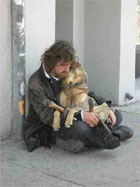
This may come as a
surprise to you, but I've long believed that dogs who belong
to homeless people are among the happiest of hounds. Sound farfetched?
Perhaps, but let me explain my theory. Most of the pampered pooches
I know are accustomed to lavish lifestyles: they live in nice
homes, romp in big backyards, play with plenty of toys, and enjoy
good food and quality veterinary care. Even with the abundance
of accoutrements, however, most dogs spend their days home alone,
which consists of taking long naps (sounds pretty good to me,
but I digress..), barking at the postal carrier, and casting
sad eyes out the window as they watch the world go by. By the
time we arrive home at the end of the day, our doggie dynamo
is rested and raring to go, but we're dog-tired and all we want
to do is flop down in front of the TV. Being the good dog guardians
that we are, though, we muster up enough oomph to take our four-legged
friend for a 5-10 minute stroll around the block and assume that's
enough. But wait a minute. If the shoe were on the other paw,
er, foot, would we be content sitting inside all day and then
being led around on a leash twice a day to do our business? Probably
not.
I'm not the only one who thinks
that forlorn Fido is getting a bum rap. Cesar Millan, the author
of Cesar's Way: The Natural, Everyday Guide to Understanding
and Correcting Common Dog Problems and the host of National Geographic
Channel's The Dog Whisperer with Cesar Millan, made this observation
in his best-selling book: "I think that dogs that live with
homeless people often have the most fulfilling, balanced lives.
Watch a homeless person walking with a dog and you will witness
a good example of a pack leader-pack follower body language.
The dog follows either beside the human or just behind him. The
dog is migrating with his pack leader, the way nature has ingrained
in him." Cesar goes on to explain that, for a dog, walking
all day in a "pack," seeking out food, and then finding
a warm place to sleep at night is akin to winning the lottery.
The homeless dog gets to meander for miles with his human companion
and then goes to bed tired. The coddled canine, on the other
hand, may sleep on plush pillows and feast on gourmet foods,
but his world is often limited to the house, the car, and perhaps
the occasional trip to the park or the groomer. Boring! He goes
to bed every night with another day's worth of pent-up energy
and frustration. And we wonder why our dogs exhibit so many behavioral
problems.
If your lonely Lab or bored
Boxer is feeling down in the dumps, you might consider hiring
a neighborhood teenager to walk him every afternoon, sign up
for doggie daycare, or even adopt another pup so your dog has
a buddy to play with.
Sure, our dogs love their toys
and treats but, in truth, they don't care whether we live on
Park Lane or in a park; they just want to spend time with us.
So, let's get up off the couch and take our dog for a long walk.
Happy trails.
When Karen (Founder and
President of All
For Animals, Inc.) is not writing her column, she's busy
handing out food to destitute dogs and their human companions.
Send her a message at karenleestevens@cox.net
|
|
Traveling with Our Animal Kids
and the Holiday Season
 This
time of year many of us are traveling. If we have human children,
we try to meet their needs regarding the trip. To keep them entertained,
we bring games, books to read or listen to on CD players and
now portable DVD players for them to watch movies. We remember
snacks and water. Perhaps their favorite toy or blanket is packed.
We talk to them about how long the trip and the visit is; who
is going to be at our destination and what we might do at our
destination and also the purpose of the trip. This
time of year many of us are traveling. If we have human children,
we try to meet their needs regarding the trip. To keep them entertained,
we bring games, books to read or listen to on CD players and
now portable DVD players for them to watch movies. We remember
snacks and water. Perhaps their favorite toy or blanket is packed.
We talk to them about how long the trip and the visit is; who
is going to be at our destination and what we might do at our
destination and also the purpose of the trip.
Do you ever think to talk with your animal kid(s) regarding your
trip? Are they going or staying behind? Why? They like to know
about it and what to expect. Do you plan your trip in regard
to their feelings and needs? Like you would for the humans involved.
If you're taking your animal kids, is the trip laid out for just
your convenience and that of the other humans you may be visiting,
or is it laid out with the well-being of your animal kids as
your first concern. (See some of the stories below.) My personal
opinion is that we should always take the well-being of our animal
kids into consideration before the likes or dislikes of visited
humans. But then, you all know that I am the advocate for the
animals.
As we learn to communicate and respect our animals, the bond
with our animal kids continues to deepen. A wonderful example
of this was Martha's (my Coordinator and, of course, she learned
to talk with her animal kids) trip with her dog, Crystal. During
the 14 hour road trip to California in one day, there were the
usual stops at the rest areas. Everyone got to use the facilities
and get something to drink. When they stopped for food, Crystal
got to place her order. Her favorite foods in this order are
hamburgers and then chicken nuggets.
What was different was the depth of their conversation. As they
drove, Crystal told Martha what her plans were when she passed.
She wanted her ashes spread at her favorite places. Crystal also
explained when and why she would be leaving her body. She shared
her plans to come back to be with Martha because she loves her
mom so much.
Also, when Martha and her husband were talking about going home,
Crystal let Martha know that she wanted to go home to be with
her kitties. She missed them and felt that she and her mom and
dad had been gone too long! By the way, everyone was so happy
to be back together.
Another person contacted me while on a road trip with her cat.
She had loaded him and all her stuff up and was on her way to
move from Seattle to Phoenix then to Florida. He knew what was
going on and the approximate amount of time it would take to
get to Phoenix. This is where their understanding started to
part ways. The woman's idea was to get there as soon as possible
which meant they would drive many long hours each day and stop
only long enough to sleep then be back in the truck and drive
more until the next time to sleep. Her cat has his own ideas.
He wanted to enjoy the trip. He wanted to stop and get out and
"smell the flowers". Being his usually great cat self,
every time she stopped at a hotel, he would get out of the car,
wonder around and then go with her into the hotel. This went
on for 3 days. Then the proverbial stuff hit the fan. He got
out of the car and ran away from her not to return. This is when
I got the call for help. He relayed that he had enough of being
in the car with his mom making all the decisions about the trip.
He told her how he wanted to travel and that he wanted to stay
where he was for 3 days (a time equal to the amount of time he
was cooped up in the car driving). This did not set well with
his mom and they had a very difficult time for several days.
Finally, she gave up wanting things her way, and he came out
to continue traveling. Until the next time she stopped, that
is. Her mind had gone back to the same mind set and he did his
same response - ran away not to return. Eventually, he did return
after much discussion between him and his mom via me. The long
and short of his story is that he wanted to be considered an
equal partner (as his person so often told him they were partners)
and decided that tolerating being overlooked in the decision
making process was not going to continue. Once mom got the message
and had a change of heart (and mind), so did he. They were reunited
and are living happily if Florida.
For those of you who are not in the habit of listening to your
animal kids, here are some messages from some dogs who wanted
their voices to be heard for others. Maybe someone you know might
recognize some similarities.
"Please explain to me, "Why after a 5 hour road trip,
you have tied up me to the bumper of your truck while you and
my family are inside a warm house, eating your Thanksgiving meal?"
Did you ever think I would like to participate in the festivities?
Besides that it is cold out here. I want my warm bed. I don't
care if the relatives don't like animals in their house. Stand
up for me, please and let me in the house!"
"One night is OK. But I am tired of being here! Maybe leaving
me at the maintenance shack with the resident dog is your idea
of taking care of me while you are off celebrating. It's not
to me! I am unhappy. Enough is enough! Do you hear me barking?
Everyone else does. I am calling you to come get me now."
If you do recognize similarities, the fix is very simple. Put
yourself in the place you have your animal kid and see how you
would feel. Chances are they feel the same. If your routine changes,
try to keep theirs as much like home as possible. We think you'll
love what it does for your relationship.
We'd like to wish you all Merry Christmas and Happy Holidays!
And, of course, from our perspective, please include your animal
family as well in your thanks and celebration. Our animals are
our greatest blessings and loving teachers. At this very special
time of year, our blessings go out to everyone for a life blessed
with love, happiness and the greatest fulfillment.
Merry Christmas and Happy Holidays! Love to you all!
Joy, Braveheart, Amira, Venus, Mercury, Ala, Dream Weaver, Deleite,
Diego, Sing, Song and Martha, Ron, Lemonade, Sidney, Crystal,
Annie
Until next time, I'm Joy reminding you, you can never love your
animal companions too much. You can only love them, hopefully,
enough.
If you would like to
schedule a private session with Joy, call 425-867-1779 or go
to www.TalkWithYourAnimals.com.
If you are interested in being a caller on Talk with your Animals,
please email Martha@AnimalRadio.com
to make arrangements. Joy Turner is a regular Animal Radio®
correspondent. She can be heard daily on Animal Radio Network.
LISTEN TO ANIMAL RADIO NETWORK NOW
 Email
your events to: root@AnimalRadio.com Email
your events to: root@AnimalRadio.com
Holiday
Window Adoption
Macy's, San Francisco
Now Thru January 1st
 The San Francisco SPCA is excited
to be partnering once again with Macy's on the presentation of
the 21st Annual Holiday Windows Adoption Outreach event. From
November 16 through January 1, 2008 adorable cats and dogs, kittens
and puppies seeking loving homes take up residence in their very
own magical pet place in the windows of Macy's Union Square store,
Stockton and O'Farrell Streets. The San Francisco SPCA is excited
to be partnering once again with Macy's on the presentation of
the 21st Annual Holiday Windows Adoption Outreach event. From
November 16 through January 1, 2008 adorable cats and dogs, kittens
and puppies seeking loving homes take up residence in their very
own magical pet place in the windows of Macy's Union Square store,
Stockton and O'Farrell Streets.
This year, Holiday Windows
at Macy's will feature six, five-foot diameter snow globes
set within a panorama of San Francisco landmarks, from the Golden
Gate Bridge to the Bay Bridge, from the Ferry Building to Twin
Peaks. The globes will house The SF/SPCA shelter dogs and cats
within a setting that salutes other San Francisco holiday traditions,
including A Christmas Carol, The Nutcracker,
Beach Blanket Babylon, and the tree lighting in Union Square.
The centerpiece of the windows will be an animated ice rink complete
with skating dogs and cats.
Last year's Holiday Windows
inspired the adoption of 200 cats and dogs and over $25,000 in
donations for The SF/SPCA. The delightful windows provide all
the "creature comforts" for the animals, including
temperature control, hidden litter boxes, and comfy spots for
those quick catnaps. Every cat and dog offered for adoption at
Holiday Windows is vaccinated, spayed or neutered, microchipped
and screened for medical or behavioral issues. Each animal comes
with a 30-day medical assistance plan, gift collar and ID tag
(for dogs), a new leash or carrier, and an "adoption kit,"
courtesy of our sponsors, filled with coupons and tips on raising
your new pet. SF/SPCA staff and volunteers will provide information
about cats and dogs, and guide adopters through every step of
the adoption process.
Watch the animals live now
in the windows at Macy at the webcam.
http://www.sfspca.org
| Rover, Get Off Her Leg! with
Darlene Arden |
 ASK
"THE DOG EXPERT"
- by Darlene Arden, Certified Animal Behavior Consultant ASK
"THE DOG EXPERT"
- by Darlene Arden, Certified Animal Behavior Consultant
Q. Dear Darlene,
 My
neighbor's German Shepherd is always chasing cars. This doesn't
seem like a good idea. Can you please tell me what I can say
to my neighbor to stop this behavior? I'm afraid I'm going to
accidentally hit the dog and, frankly, I'm scared. My
neighbor's German Shepherd is always chasing cars. This doesn't
seem like a good idea. Can you please tell me what I can say
to my neighbor to stop this behavior? I'm afraid I'm going to
accidentally hit the dog and, frankly, I'm scared.
Amalia
A. Dear Amelia,
You have every reason to be scared. I wish your neighbor were
as concerned about his dog as you! You can explain to your neighbor
that it is dangerous for the dog to be loose, that dogs don't
need "freedom," which is usually the excuse of the
uneducated pet owner. An adult dog has no more mental development
than a human toddler, nor can he read street signs. It is for
his safety that the owner should walk him on leash. This will
not only give the dog and owner exercise but will promote the
human-animal bond.
If this isn't enough to convince your neighbor that his dog can
get hit by a car, you might also remind him that along with a
veterinary bill or a dead dog, he is also responsible for any
injuries caused to the driver, passenger(s) and car of the person
who hits his dog, or swerves to avoid hitting the dog and has
an accident, even if it's a minor fender-bender such as hitting
a trash can or mailbox. However, injuries can be far worse than
that.
If you are not the only neighbor who is concerned, then several
of you might approach him at one time. Try to keep it friendly
and concerned because you still have to live near this person
and you will have to say it carefully so that you don't create
animosity but do show concern for the neighbor and the dog as
well as the innocent driver who might hurt the dog or be injured
trying to avoid hitting the dog.
Good luck with educating your neighbor!
"Ask the Dog Expert"
is a regular column by Darlene Arden. This month's column features
information found in her book, "The Angell Memorial Animal
Hospital Book of Wellness and Preventive Care for Dogs,"
(McGraw-Hill), which helps you, in concert with your veterinarian,
design a wellness program based on your dog, your lifestyle and
the place where you live, and "Small Dogs, Big Hearts,"
(Howell Book House), and the newly released, "Rover, Get
Off Her Leg!" Further information may also be found on her
website: www.darlenearden.com.
Copyright 2007 by Darlene Arden. All Rights Reserved.
| ANIMAL
RADIO® BOOK REVIEW for December |
|
    \ \ (rated
5 out of 5 paws) (rated
5 out of 5 paws)
 Planet Cat by Sandra Choron, Harry Choron
and Arden Moore Planet Cat by Sandra Choron, Harry Choron
and Arden Moore
Paperback: 424 pages
Publisher: Houghton Miller (Nov 2007)
ISBN-10: 0618812598
ISBN-13: 978-0618812592
Reviewed by Hal Abrams
Don't plan on putting Planet
Cat on the bookshelf anytime soon. It's full of tasty tidbits
and momentous morsels for the short attention span. It truly
is the epitome of cat-erature for the feline fanatic!
 Hear Arden Moore on Animal Radio® Hear Arden Moore on Animal Radio®
 \ \   (rated 4 out of 5 paws) (rated 4 out of 5 paws)
 Cat Yoga
Fitness and Flexibility for the Modern Feline by Rick Tillotson Cat Yoga
Fitness and Flexibility for the Modern Feline by Rick Tillotson
Hardcover: 128 pages
Publisher: Clarkson Potter (Oct 2007)
ISBN-10: 0307352544
ISBN-13: 978-0307352545
Reviewed by Judy Francis
Yoga is a system or set of
breathing exercises and postures derived from or based on Hindu
yoga. It improves physical, mental and emotional health in humans,
so why shouldn't our felines benefit too?
You probably have already witnessed
your cat doing some yoga positions as he wakes from a nap. In
this book, you will find 60 color photos of cats in various yoga
positions, from the Warrior Pose (ideal for strengthening the
legs and back) to the Gatyatmak Meru Vakrasana (designed for
kitties who need to lose a few pounds). These agile cats have
unlocked the power of yoga to obtain improve balance, a slimmer
waistline, mental clarity, and of course, fuller whiskers.
Cat Yoga is a hilarious tongue-in-cheek
"guidebook" for kitty yogis-to-be. And, just like in
humans, check with your veterinarian before your kitty begins
any new exercise program.And even if you don't have an aspiring
Cat Yogi, the pictures will bring a smile to your face!
 Hear Rick Tillotson on Animal Radio® Hear Rick Tillotson on Animal Radio®
See other reviews at AnimalRadio.com.
Send books and literature for review on-air and in this newsletter
to: Animal Radio Network™ Book Reviews, 233 East 330 North,
Kanab, Utah 84741. Product may not be returned. Allow 5 weeks
for review.
|
Too Much Chocolate Can Kill
Fido!
By Dr. Debbie White
 During the holidays, we may put out
different types of goodies for our guests, including chocolate.
Dr. Debbie White gives us the lowdown on chocolate and our pets. During the holidays, we may put out
different types of goodies for our guests, including chocolate.
Dr. Debbie White gives us the lowdown on chocolate and our pets.
Is it true chocolate can kill
my dog?
Yes, ingestion of excessive amounts of chocolate can cause a
dog to become severely ill and even lead to death.
What is in chocolate that is
so dangerous?
Chocolate contains a compound called theobromine, which has stimulatory
effects on the heart, nervous tissue and other tissues.
What toxic signs will be seen?
Vomiting
Restlessness and hyperactivity
Abdominal pain
Increase heart rate and arrhythmias
Increased urination
Muscle stiffness with occasional twitching
Seizures
Death due to cardiac and respiratory arrest
How is chocolate toxicity diagnosed?
Most frequently chocolate toxicity is diagnosed based on the
history and the clinical signs seen. Usually the pet owner reports
seeing the dog eat large quantities of chocolate or finding the
empty package of chocolate.
A test called high performance
liquid chromatography may be performed to confirm the diagnosis.
This test measures levels of theobromine in blood, urine, tissue
or stomach contents. This test is not available at the average
veterinary clinic however. It is performed mostly at universities
and research institutions.
Are all forms of chocolate
equally toxic?
No. The amount of theobromine varies with different forms of
chocolate. A brief comparison of some of the different types
of chocolate is shown below.
Type of Chocolate - Amounts
of Theobromine (mg)
Unsweetened baking chocolate (1 oz) 393
Semi-sweet chocolate (1 oz) 138
Hot cocoa (6 oz cup) 75
Milk chocolate (1 oz) 44-56
White chocolate (1 oz) 0.25
A single four-ounce milk chocolate
candy bar can contain approximately 240 mg of theobromine. Unsweetened
baking chocolate has over eight times the amount of theobromine
as regular milk chocolate and therefore poses a greater threat
of inducing toxicity. It is vital to know what kind of chocolate
was eaten so that the veterinarian can effectively assess the
condition.
How much chocolate is dangerous
to my dog?
The reported lethal range of theobromine is 100-200 mg for every
kilogram of the dog's weight. Adverse side effects can be noted
with lower doses. Consider the situation of the average sized
25-pound dog. Should this dog eat a single candy bar it would
probably not produce any significant clinical effects. It would
take a total ingested amount of 1134 mg of theobromine in order
to cause death. This means that a 25-pound dog would have to
eat a total of 3 ounces of baking chocolate or approximately
five bars of milk chocolate for it to be a lethal ingestion.
So, for the average sized dog,
a single milk chocolate candy bar will probably not lead to any
significant effects. The problem is encountered when excessive
amounts of chocolate are ingested. Owners should be aware of
possible toxic effects of chocolate especially at times when
chocolate is plentiful: Halloween, Valentine's Day, Easter and
Christmas.
Is there a treatment for chocolate
toxicity?
There is no specific antidote available to counteract the effects
of theobromine. Immediate veterinary care is indicated in cases
of suspected chocolate toxicity. A variety of drugs and treatment
procedures may be utilized depending on how long it has been
since ingestion of the chocolate. Once at the veterinarian's
office, the dog may be given drugs to induce vomiting, decrease
the drug's absorption, increase the speed of drug elimination
from the body and control seizures or arrhythmias. If there is
any doubt regarding the quantity of chocolate ingested, seek
veterinary care.
What is the prognosis once
chocolate toxicity is diagnosed?
If treatment ensues within a few hours of ingestion, the prognosis
is good to excellent. Once the toxicity progresses to seizures,
the prognosis becomes worse.
Can my cat be affected by chocolate
toxicity as well?
There have never been any documented cases of a feline chocolate
toxicity. It is unlikely for a cat to suffer form chocolate toxicity
due to its eating habits. Cats do not usually gorge themselves
on large quantities of food, but instead they eat small quantities
of food at a time.
Dr. Debbie White, the
Lone Mountain
Animal Hospital in Las Vegas, Nevada, is the official veterinarian
for the Animal Radio® four studio cats.
 Hear Dr.
White on Animal Radio® Hear Dr.
White on Animal Radio®
Giving
Pets as Gifts this Holiday Season
 The
holiday season is upon us. Following the thoughts of 'good cheer'
and 'good will', come the thoughts of 'good gifts'. What should
I give to " insert name" this year? The
holiday season is upon us. Following the thoughts of 'good cheer'
and 'good will', come the thoughts of 'good gifts'. What should
I give to " insert name" this year?
It is tempting to pick up a
cute puppy, kitten, or other pet for a family member. You think,
"Hey! They'll love it they've got kids!" or "Grandma
needs a companion now that she is on her own." Or "He
loves to jog and now he'll have a jogging buddy".
While we applaud your intentions,
we ask you to rethink them. Yes, our purpose is to help find
homes for homeless pets but we want to find them their "forever"
home. Too many pets given during the holidays with good intentions
get returned or, worse, are neglected.
Great Ways To Give the Gift
of a Pet:
 If you want to give
a pet for the holidays, we suggest purchasing a gift card (ex.
visa) or create your own gift certificate - that will cover
the cost of adoption and perhaps any items necessary to make
a home pet friendly to welcome the new family member such as
bowls, crates, toys, food, etc. (Please encourage them to use
their gift card to adopt a new pet. From pure breeds to mutts,
from large to small, from active to lazy, there is sure to be
the perfect companion match!). If you want to give
a pet for the holidays, we suggest purchasing a gift card (ex.
visa) or create your own gift certificate - that will cover
the cost of adoption and perhaps any items necessary to make
a home pet friendly to welcome the new family member such as
bowls, crates, toys, food, etc. (Please encourage them to use
their gift card to adopt a new pet. From pure breeds to mutts,
from large to small, from active to lazy, there is sure to be
the perfect companion match!).
We also suggest that you encourage
the soon-to-be pet owner to select a pet after the holidays are
over. This way, the pet will receive all the attention it needs
and can bond much easier with its new family!
Join in the fun! Ask to be
a part of the process and go along with them while they look
for their new family member. Another great reason to adopt a
pet is that shelter and rescue workers know their adoptable pets.
They can help match the family with the perfect companion!
Another option is to sponsor
a shelter pet in the name of a friend or family member. Many
shelters and rescues offer this feature on their sites. It is
a great way to give a gift that is always the right size, gives
your friends or family a good feeling, and makes a difference
in the life of a shelter pet.
8 Reasons Why We Suggest You
Don't Surprise Someone With a Pet:
- Pets are a 10 to 20 year commitment.
They are not toys that can put in the corner when the thrill
is gone. Living creatures all have needs including the
need to be loved, nourished, trained, and treated well.
- The holiday season is hectic
for humans. Relatives come and go. Family members spend more
time away from home. Strange decorations fill the home
candles, trees, and an abundance of electric cords. This is not
a good time to introduce a new family member to your household.
The new pet will need lots of attention something most
people don't have to spare around the holidays. Your new little
pet has no idea where she is now living. Where should I go potty?
Who are these strange people? What am I allowed to do?
- Pets cost money to upkeep.
When you buy a shirt for someone, there's not a lot of added
expense. Pets need food, toys, vet appointments, grooming, etc.
Maybe Grandma is living on a limited income and can't afford
the added expense.
- Pets are individuals. Just
like people, pets have their own personalities. You may pick
a dog that requires lots of exercise but your Uncle Joe's family
consists of all couch potatoes. All members of a family
2 legged and 4 legged should meet a new pet before a decision
is made.
- Allergies, asthma, and other
medical conditions. Many pets are returned because little Susie
or Dad have severe allergies to pets. You may not be aware of
health issues relating to having a pet. Or, for older adults,
smaller pets may get under their feet and trip them.
- You may love pets, but not
everyone else does. Or, perhaps they love pets but aren't educated
enough about being a responsible pet owner. You may want to consider
giving them a book on this topic.
- Not all animal lovers want
puppies or kittens. You may find them adorable, but a more mature
pet may be a better fit.
- Many puppies and kittens given
as gifts end up in shelters for adoption or are euthanized for
"behavior issues". Most of these returns could be avoided
with adequate training, attention to the pet, and the proper
initial selection of the pet.
So, this holiday season, please
do encourage pet adoptions. Provide a gift card or gift certificate
for a family member or friend to purchase a pet after the craziness
of the holiday season is over. Go along with all the members
of the household for the selection process. Then, have a great
time with the new family member.
Animal
Radio®
is a proud partner with Pets911!
Hear about the latest Pets911 activities on-air on Animal Radio®
G'day from down under!
 As
pet owners the hardest decision we ever have to make is when
and whether to humanely say goodbye to an aged, infirm or injured
animal. As
pet owners the hardest decision we ever have to make is when
and whether to humanely say goodbye to an aged, infirm or injured
animal.
But how hard must it be to voluntarily decide to euthanize your
pet, simply because it 'broke our rules' ie; don't bite
or attack anyone, especially young kids!
This month particularly
as families start to gather for the holiday season - we thought
we would share with you part of a letter from one of our Aussie
listeners. (The entire letter is here)
This letter is a timely reminder
to NEVER leave a dog (of any size) alone with a child under about
8 years of age.
Colleen has her fair share
of problems. A son with Asperger's syndrome (a form of autism)
a sister who does not enjoy good health and Colleen herself
who got her dog Harry in 2003 after suffering a stroke. Colleen
and Harry were great buddies spending countless hours on her
bed laughing and playing silly games.
They were the best of friends
which makes this story even more sad.
Colleen writes:
 On Sunday the 7th October, I
had my grandson Cameron, who is 17 months old, come to stay with
me, while his parents had a day out. We had scrambled eggs for
breakfast, and afterwards, I let Harry back into the room. On Sunday the 7th October, I
had my grandson Cameron, who is 17 months old, come to stay with
me, while his parents had a day out. We had scrambled eggs for
breakfast, and afterwards, I let Harry back into the room.
As I was walking towards the
kitchen Harry went for Cameron (attacked him), and my first instinct
was to pick Harry up and remove him from the room. If I had picked
Cameron up, Harry might have still have gone for him.
Harry has been around Cameron since Cameron was born, and there
had never been an issue between the two of them, so this incident
was totally unexpected. I found out from my daughter Mary-Anne
that night that Cameron had a few scratch marks on his chest.
I had no choice but to have Harry euthanased, which broke my
heart, but I felt that there was no other choice, as a child's
life is not worth ANY risk, and I love my grandson more than
anyone can imagine.
Harry went to Dog Heaven on Tuesday the 9th of October, one of
the saddest days of my life, as he was my little mate, and even
now, writing this, the tears are streaming down my face.
My sister Anne, who weighs just 43kg, took me with Harry to the
vet, but we waited until that afternoon to bury him in my back
yard, as I was too upset to do it. Anne's husband Neil, came
over around 2.30pm to help lay Harry to rest.
We all had a hug and cry together.
The only reason I can come up with for Harry's change in behaviour
is because he must have felt threatened by Cameron going near
him, as Harry was sniffing around the floor looking for food
scraps after we had finished breakfast.
The thing that gets me though, Brian and Kaye, is that this scenario
has happened umpteen times before, but Harry hasn't done anything.
Anyway, it has been almost three weeks since my little mate physically
left me, but I can feel him following me around the house, and
right now he must be wondering why I'm crying again.
I say good morning and good night to Harry every day, and I'll
attach some photos for you to peruse, as well as a letter I wrote
about Harry to help me through the grief.
I still miss all my pets who have gone on, but Harry's passing
has hit me the hardest, as he was therapy for me as well, after
having my stroke.
He was just what the doctor ordered. We both enjoyed going for
walks in our neighbourhood, and there wasn't a thing I couldn't
talk to Harry about, and not have to worry about anyone else
finding out about it.
We won't be having any more pets, as it is too sad saying good-bye
to them, but I am considering getting a couple of fish, as they
are calming and we don't get so emotionally or physically attached
to them as we do with dogs and cats."
(reprinted with permission)
PawNote:
A reminder to NEVER leave a child under 8 years of age and a
dog alone - even if 'nothing has ever happened' before.
This 'normal behaviour' for a dog - probably just protecting
his food scraps - could have had tragic consequences for young
Cameron which Colleen bravely acknowledges through her obviously
difficult decision to have Harry euthanased.
I hope we haven't made you
feel too sad this month but these things are very important to
be reminded about.
If you are visiting or have relatives or friends over this holiday
season and there are animals (dogs especially) and young kids
just remember Colleen's story about her little dog Harry.
Hugs for your pets Brian & Kaye
PS: We are 'coming to America' in December January and hope to
catch up with Hal & Judy from Animal Radio why not
write them and see if they'll let us on the show !!!
Hear Pet Talk Radio!
on Animal Radio Network - LISTEN TO ANIMAL RADIO NETWORK NOW
- Check schedule for showtimes.
Voice of the Animal on Animal Radio®
Rae Ann Kumelos Ph.D. |
Flying Reindeer: Not Just
a Christmas Fable
 You
know Dasher and Dancer and Prancer and Vixen, Comet and Cupid,
and Donner and Blitzen. But what do you know about that most
famous reindeer of all? You
know Dasher and Dancer and Prancer and Vixen, Comet and Cupid,
and Donner and Blitzen. But what do you know about that most
famous reindeer of all?
For some, the television appearance
of Rudolph the Red Nosed Reindeer marks the true beginning of
the holiday season. Written in 1964 as a Christmas promotion
for the Montgomery Ward department stores, the story of Rudolph
and his flying reindeer friends is the longest running special
on television. But do you know that behind this beloved stop-motion
animated T.V. show is a true story of flying reindeer?
It makes perfect sense that
reindeer would be Santa's animal of choice. Reindeer live exclusively
in the north. Their thick coats and wide feet are perfect for
the sub-zero cold of Scandinavia, Russian Europe, and Asia, where
5000 years ago, reindeer were the first large animals to be domesticated.
In Greenland, Iceland, Canada, and Alaska, reindeer are wild,
and more popularly known as caribou. Reindeer became extinct
in Scotland in the tenth century, but somewhere in the psyche
of the hearty Scots they were necessary, for they were re-introduced
to that country in 1952. Laplanders use reindeer to pull sleighs,
and so does the postman in Wales, Alaska.
For centuries, reindeer herding
has been a way of life along the mountain forests of the Russian
Mongolian border. Though threatened by economic, government,
and cultural changes, just as their ancestors did, these northern
indigenous people still raise reindeer for packing, riding, and
milk. Since female reindeer are the only deer species to grow
antlers, they consider a reindeer -doe the mother of the universe
and a symbol for feminine strength.
For these northern cultures,
Reindeer is revered as a totem power animal, one that can fly
through the world of spirit to commune with the high gods. Reindeer
is the sacred animal that carries the Arctic shaman to the Otherworld.
In fact, the relationship between reindeer and shaman holds special
significance for Rudolph and Santa. During mid-winter ceremonies,
the shamans of the far north would partake of the hallucinogenic
fly agraric mushroom °© the bright red mushroom with
red spots that we see associated with fairy tales and Christmas
decorations °© to achieve an altered state that would
allow the shaman to travel into otherworldly realms. In ceremonies
held to honor the December 21 winter solstice, the local shaman
would enter a yurt through the smoke hole at the top, bringing
with him a bag of the colorful mushrooms, departing again through
the smoke hole after the festivities. This entry and departure
through the ceiling led people to believe the shaman could fly,
and since reindeer also consider the hallucinogenic colorful
red mushroom a delicious delicacy, they were believed to fly
with him. Hmmm, a blessed man who carries a bag full of special
red and white gifts down a chimney, lives in the far north, and
flies with reindeer. Sound familiar?
In ancient Norse myth, Thor,
the god of thunder and lightening (words which in old German
are donner and blitzen), also lived in the far north and was
associated with the color red. Thor fought the gods of snow and
ice to conquer cold and bring spring °© and he did it
while riding in a golden flying chariot pulled by two flying
goats, Gnasher and Cracker.
During this holiday season,
when you see a shiny red-nosed Rudolph adorning a lawn, store
window, or parade float, remember this reindeer carries in his
sleigh a legacy of Arctic shamans, flying goats, and the god
of thunder and lightening; certainly reason enough he should
go down in history.
Visit us at http://www.voiceoftheanimal.com to hear more
stories and to order CD's of Voice of the Animal programs. Copyright
2007 Voice of the Animal. Rae Ann Kumelos is a regular
Animal Radio® correspondent. She can be heard daily on Animal
Radio Network. LISTEN TO ANIMAL RADIO NETWORK NOW
| Ask the Bird Folks with
Mike O'Connor |
Dear Bird Folks,
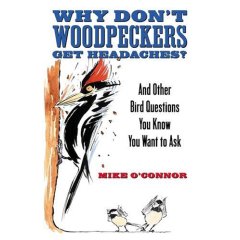 I'm
thinking about building a few birdhouses as Christmas gifts.
My problem is that I can't seem to find a basic set of plans.
I have purchased several books but they all feature houses that
are way too fancy for my birds and too difficult for my skills.
Do you have any suggestions where I might find some simple birdhouse
plans? I'm
thinking about building a few birdhouses as Christmas gifts.
My problem is that I can't seem to find a basic set of plans.
I have purchased several books but they all feature houses that
are way too fancy for my birds and too difficult for my skills.
Do you have any suggestions where I might find some simple birdhouse
plans?
- Katie, Hamilton, Ontario, Canada
I know what you mean, Katie,
It is almost impossible to find a book on buildable birdhouses.
For some reason publishers feel that they need to print books
with plans that are not only impossible for the average person
to build, but would totally scare the birds if someone did build
them. The birds in Canada certainly don't want a house that looks
like the Chateau Frontenac or the SkyDome. (Yes, I know they
have changed the name of the SkyDome to the "Rogers Centre,"
but everybody knows that was a mistake.) Birds are simple folk.
They don't use condiments on their food and they don't need an
architect to design their homes. A simple rectangular box may
seem dull to us, but it's a welcome sight for a bird looking
to build a nest.
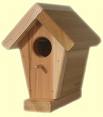 Before
you look for birdhouse plans, you need to decide which species
of bird you want to build a house for. The larger the bird, the
larger the box needs to be. (It's amazing the stuff I know.)
If you are going to make only one kind of box, a bluebird box
would be a good choice. Not only might you get a family of bluebirds,
but you could also attract some smaller birds like nuthatches,
chickadees or wrens. The smaller birds are happy to use a large
box built for bluebirds. However, the larger bluebird can't use
a smaller bird's box. So, if you hate bluebirds, build a box
for wrens or chickadees and that will keep them out. I don't
usually recommend discrimination in any form, but this isn't
government housing. If you don't like bluebirds, nobody will
stop you from building a box that is only sized for chickadees.
It's your call. Do you feel the power? Before
you look for birdhouse plans, you need to decide which species
of bird you want to build a house for. The larger the bird, the
larger the box needs to be. (It's amazing the stuff I know.)
If you are going to make only one kind of box, a bluebird box
would be a good choice. Not only might you get a family of bluebirds,
but you could also attract some smaller birds like nuthatches,
chickadees or wrens. The smaller birds are happy to use a large
box built for bluebirds. However, the larger bluebird can't use
a smaller bird's box. So, if you hate bluebirds, build a box
for wrens or chickadees and that will keep them out. I don't
usually recommend discrimination in any form, but this isn't
government housing. If you don't like bluebirds, nobody will
stop you from building a box that is only sized for chickadees.
It's your call. Do you feel the power?
There are several features
that your birdhouse should have. One is proper ventilation. It
gets hot during the nesting season, even in Canada. Baby birds
could roast without a way for trapped heat to escape. A small
gap at the top of the two sides, just below the roof, will not
only provide the birds with fresh air, but it will also provide
you with a good excuse when you don't cut the wood straight.
Next, drill a couple of holes in the bottom of the box. More
than one nest of baby birds has been lost when driving spring
rain turned their nesting cavity into an indoor swimming pool.
The inside of the box needs
little help from us. We don't have to add windows, curtains,
wallpaper or paint...especially paint. Never paint or stain the
inside of the nest box. Baby birds have enough problems with
live worms being stuffed down their throats all day without having
to deal with paint fumes, too. However, the little birds could
use some help getting out of the box when it is ultimately time
for them to leave. Scuff up the inside of the front of the box
or tack a piece of plastic screening just below the hole to give
the young birds something their little claws can grasp when they
finally exit the box for the first and only time.
It's also a good idea to assemble
the box with screws instead of nails. Screws allow for easy repair
after a hole is chewed in the side by squirrels, woodpeckers
or arboreal beavers. More importantly screws makes it easier
to remove a side or top for cleaning. A nest box should be cleaned
a few times a year to dump out soiled nests, broken eggs, mice,
wasps or various other unwanted houseguests who may have moved
in. Too bad dumping our own unwanted houseguests wasn't as easy.
As I mentioned earlier, the
key to a successful nest box is to build it the proper size;
in particular making the entrance hole the correct size. I could
give you these sizes and dimensions, Katie, but I only know inches
and you Canadians use those weird metric measurements such as
"mm," "cm" or "CCM." But I think
I know just the book that will take you the rest of the way.
The book that has the best
basic plans is the Birdhouse Book, by Donald and Lillian
Stokes, that cute couple who write books on every conceivable
bird topic. This book is just what you need. It has nothing but
dull, plain birdhouses in it, just the kind of boxes birds love.
If you follow their plans you will end up with a good, functional
birdhouse and not some lame thing that looks like the SkyDome.
And the best part is you won't have to worry about some bonehead
ever changing the name of your birdhouse to the Rogers Centre.
Besides being a frequent
guest on Animal Radio®
- Mike O'Connor is the
owner of the Bird Watcher's General Store on Cape Cod, which
opened in 1983 as one of the first stores in the United States
dedicated solely to birding. His column, Ask the Bird Folks,
appears weekly in The Cape Codder, The Register, The Harwich
Oracle, and The Upper Cape Codder newspapers, and his writing
was included in the Best American Science and Nature Writing
2004. Copyright 2007 by Mike O'Connor. All Rights Reserved. http://www.BirdWatchersGeneralStore.com
Child Raises Over $30,000
for the Animals
Kyle Orent
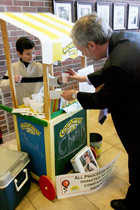 Kyle Orent is
a 9-year-old from Northport, New York who raised more than $20,000
selling lemonade. Kyle Orent is
a 9-year-old from Northport, New York who raised more than $20,000
selling lemonade.
His next endeavor was to auction
off celebrity-autographed dog collars (donated by Bamboo). Some of the celebrities that autographed
those collars were Leslie Nielson, Betty White, Sheena Easton,
Joe Namath, Donald Trump, Billy Joel and Dean Koontz (whose collars
collected the highest bid) to name a few. He raised over $5,000
for his collars and was matched by a generous donation from someone
who wished to remain anonymous, raising the total to $10,300.
Kyle then donated it all, $30,300,
to Canine
Companions for Independence. When asked why he chose this
charity, Kyle says he is a big animal lover and likes how these
animals have been trained to assist their humans and wants to
help.
It was a pleasure working with
this child whose love for the animals is so obvious. We only
hope to be involved in his next endeavor. Cheers to you Kyle!
|
|
LISTEN TO ANIMAL RADIO NETWORK NOW
We Wish You and
Your Pets a Safe and Merry Christmas and a Happy New Year!
  

Return
to Menu
Go to AnimalRadio.com
|
| Search Animal Radio®
Network |
|
|
|
|
 FINAL POOP FINAL POOP
*  RSS FEED: Get the Animal
Radio® Podcast RSS Feed
or the Animal Radio®
News RSS Feed and stay
updated. RSS FEED: Get the Animal
Radio® Podcast RSS Feed
or the Animal Radio®
News RSS Feed and stay
updated.
* COPYRIGHTS: Animal
Radio® and Animal Radio® Network are Registered Trademarks of
Animal Radio Network LLC, and may not be used in affiliation
without express written consent of Animal Radio Network LLC.
Material in this newsletter may not be published or broadcast
without permission. All rights reserved - Fair Use Notice: The
not-for-profit educational reproduction of some articles contained
within this newsletter constitutes fair use of the copyrighted
material as provided for in section 107 of the US Copyright Law.}
 * CONTRIBUTIONS, EDITORIALS OR SUBMISSIONS
to Animal Radio® Network
Newsletter or Programming may be sent to: 233 East 330 North,
Kanab, UT. 84741 or root@animalradio.com.
Unsolicited manuscripts may not be returned. See our website for additional information
about article submissions. Email your editorial comments or opinions
to us at: YourVoice@AnimalRadio.com * CONTRIBUTIONS, EDITORIALS OR SUBMISSIONS
to Animal Radio® Network
Newsletter or Programming may be sent to: 233 East 330 North,
Kanab, UT. 84741 or root@animalradio.com.
Unsolicited manuscripts may not be returned. See our website for additional information
about article submissions. Email your editorial comments or opinions
to us at: YourVoice@AnimalRadio.com
* If you're a RADIO PROGRAMMER
and would like to air ANIMAL RADIO®
- call 435-644-5992 to get all the information you need to begin
broadcasting America's number one animal talk show geared to
listeners that like to have FUN! Animal Radio® programming is FREE for your station
- and delivered via Satellite (Jones and ABC/NY Starguide) or
Compact Disc or MP3 every week.
 *
ADVERTISING OPPORTUNITIES for 2008 ANIMAL RADIO®
PROGRAMMING available. Call 435.644.5992. Animal Radio® Network, according to Arbitron radio
ratings, is the most-listened-to animal programming in the United
States. Animal Radio® airs
weekly in ninety-plus cities. Our affiliate stations are top
performers including KOST 103.5 in Los Angeles. Animal Radio® is the most concentrated radio audience
of targeted animal lovers anywhere! Please contact us for aggressive
and omnipotent branding and cultivating customer loyalty. Advertising
opportunities in this newsletter are also available. 40,000 subscribers
are reading this newsletter right now! *
ADVERTISING OPPORTUNITIES for 2008 ANIMAL RADIO®
PROGRAMMING available. Call 435.644.5992. Animal Radio® Network, according to Arbitron radio
ratings, is the most-listened-to animal programming in the United
States. Animal Radio® airs
weekly in ninety-plus cities. Our affiliate stations are top
performers including KOST 103.5 in Los Angeles. Animal Radio® is the most concentrated radio audience
of targeted animal lovers anywhere! Please contact us for aggressive
and omnipotent branding and cultivating customer loyalty. Advertising
opportunities in this newsletter are also available. 40,000 subscribers
are reading this newsletter right now!
* WEBMASTERS: Offer your
web-visitors Animal Radio®
audio content when they visit your website. Cut and paste the
code below to create a graphical link directly to the Animal
Radio®.
<A HREF="http://animalradio.com/cfc.mp3">
<IMG SRC="http://animalradio.com/listenowbutton.gif"
ALIGN="BOTTOM" BORDER="1" ALT="AnimalRadio.com"></A>
Offer your web-visitors
Pet Headline News:
Give your visitors up-to-the-minute
news headlines direct from Animal Radio® - Put this
Animal Radio® News Module on your website. Place the following code
where you want the module to show up. 
<p style="margin-top:10px;
margin-bottom:0; padding-bottom:0; text-align:center; line-height:0">
<a href="http://feeds.feedburner.com/~r/AnimalRadioNews/~6/1"
TARGET="_blank">
<img src="http://feeds.feedburner.com/AnimalRadioNews.1.gif"
alt="Animal Radio News" style="border:0"></a></p>
<p style="margin-top:5px; padding-top:0; font-size:x-small;
text-align:center">
* HOW TO UNSUBSCRIBE FROM
THIS NEWSLETTER (sorry to see you go!) To be Removed from
this list - Please reply
with "Unsubscribe" in the subject line. You will be
removed within 24 hours. NOTE: You must reply from the exact
same address that you used to sign up for this newsletter. WANT
TO SUBSCRIBE? Go to http://AnimalRadio.com
to sign up from the front page.
Copyright 2007
Animal Radio® Network LLC
|
|
 NETWORK PROGRAMS:
NETWORK PROGRAMS: NETWORK PROGRAMS:
NETWORK PROGRAMS: